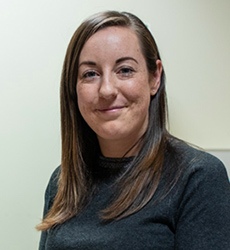Dr Maria Paton
Which NHS and academic institutions do you work for?
I work as a clinical academic researcher at the University of Leeds within the Institute of Cardiovascular and Metabolic Medicine, and as a highly specialised Clinical Scientist at Leeds Teaching Hospitals Trust leading the combined heart failure and cardiac device service.
What do you like about being a clinical academic?
My day-to-day practice is incredibly diverse, revolving around diagnosing and managing patients in our specialised service for patients with heart failure and a cardiac device, recruiting patients to our research programmes, collecting and analysing data, presenting findings, supervising students, and delivering lectures.
I work with such a diverse group of professionals and I feel incredibly lucky to be able to use my research to drive our services, not just locally, but by helping teams across the country determine how they can best serve their patients. The best part is making changes and getting feedback from people who use the service.
Can you briefly describe how you became and developed as a clinical academic?
I first got a taste for research carrying out my undergraduate dissertation. This made me realise that there are many unanswered questions in clinical practice and it dawned on me that perhaps traditional medical academics were not best-placed to plug these gaps and implement changes.
Since then I have undertaken an MSc in advanced practice and a research fellowship with Health Education England before I was awarded a doctoral fellowship with the NIHR to continue my research to prevent heart failure in patients with cardiac devices. This led to being offered a role to lead the heart failure and device services within cardiac science at Leeds Teaching Hospitals to help develop an integrated service.
Give one example of where your work has changed practice?
One of my PhD studies showed that as cardiac scientists, if we carefully program pacemakers for each individual patient, we can preserve a patient’s heart function and their pacemaker battery longevity, without any detrimental effect on their quality of life. I was really proud when I was approached to contribute to national guidelines by making suggestions on pacemaker programming because of this work and hopefully can take it even further to European practice.
What advice would you give to a healthcare scientist who is an aspiring clinical academic?
Reach out to people! There may not be a large group of clinical academics in your local area but we are a friendly bunch, and we are more than willing to help anyone who gets in touch. Start looking online for webinars and networks you can join to increase your knowledge. Align with your local research facilities and R&I department and see what opportunities they have. Start small; put an abstract in at a conference, start working on a research project, volunteer to teach, but think big – have an one-sentence idea of what you want to be (remembering that this can change)!
